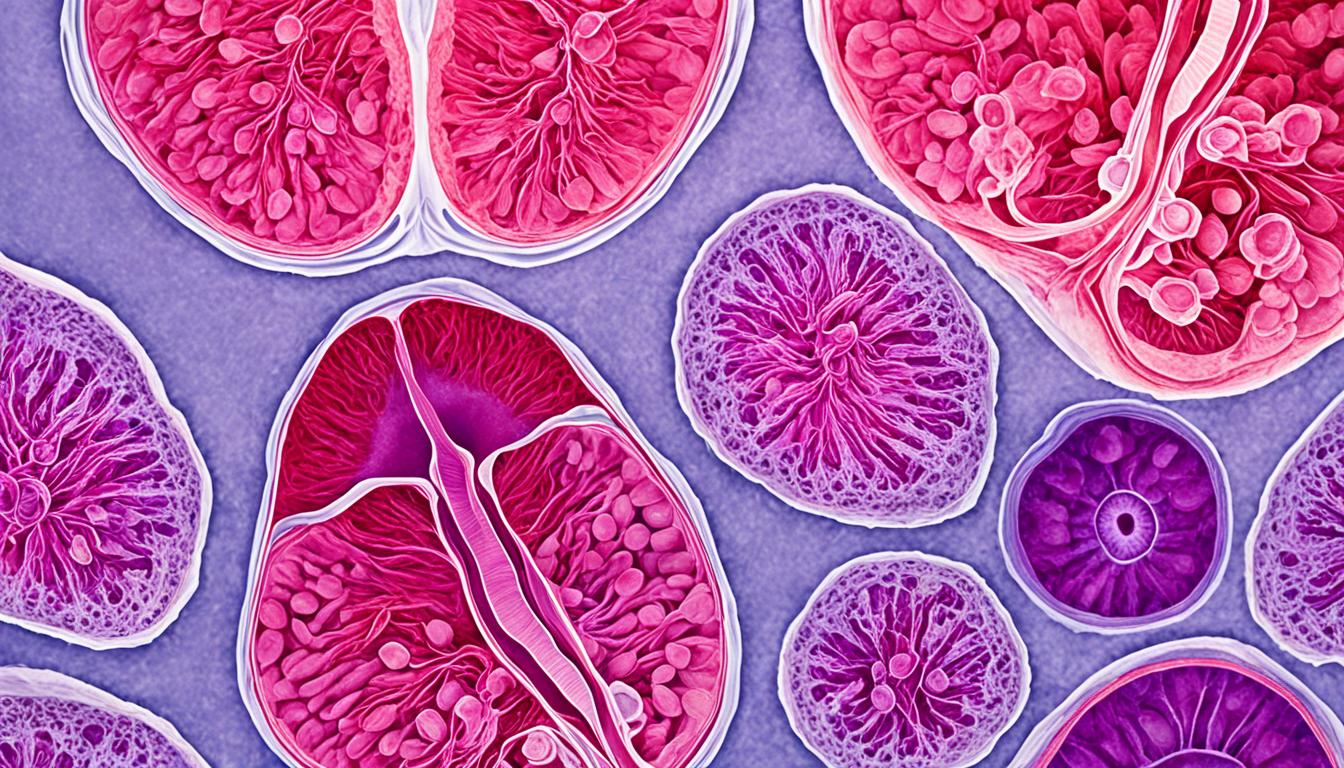Uterine fibroids are benign growths in the uterus. They often happen in women during their childbearing years. These growths, called myomas or leiomyomas, do not increase cancer risk in the uterus. They can be small enough to be unseen or large enough to fill the pelvis or stomach area. Many times, women with fibroids don’t notice any symptoms. Doctors may find them during routine check-ups or when checking on a pregnancy.
Key Takeaways:
- Uterine fibroids are benign uterine growths that commonly occur in women during their reproductive years.
- These noncancerous tumors, also known as myomas or leiomyomas, are not linked to a higher risk of other types of cancer in the uterus.
- Fibroids can range in size from small growths to larger tumors that can fill the pelvis or stomach area.
- Many women may have uterine fibroids without experiencing any symptoms.
- Uterine fibroids can be discovered during routine pelvic exams or pregnancy ultrasounds.
Symptoms and Diagnosis of Uterine Fibroids
Uterine fibroids are common non-cancerous growths in the womb that affect women. They vary in symptoms based on their size, location, and number. Recognizing the signs early is critical for treatment. Ask your doctor if you notice any symptoms like the following:
1. Heavy Menstrual Bleeding
Heavy bleeding during periods is a key sign of fibroids. It can mean more blood, longer periods, or having to change pads or tampons often. This can be bothersome and uncomfortable.
2. Painful Periods
Dysmenorrhea, or painful periods, is another common symptom. It can cause cramps and pelvic pain. These pains can affect your daily life and well-being.
3. Pelvic Pressure
Feeling pressure or fullness in your lower belly could be from fibroids. This feeling may always be there or get worse with activity.
4. Frequent Urination
Bladder pressure from fibroids might make you urinate often or feel like you need to go all the time. It can disrupt sleep and lower your quality of life.
5. Growing Stomach Area
Large or numerous fibroids can make your stomach look bigger. This could also signal other stomach issues, so it’s best to have a doctor check it out.
6. Constipation
Fibroids that press on the rectum may cause constipation. This issue can be eased with changes in diet and lifestyle.
7. Lower Back Pain
Backache can be caused by uterine fibroids, which may feel dull or sharp. It can limit your daily life and well-being greatly.
8. Pain During Sex
Pain during sex can be a sign of uterine fibroids. It can impact your relationship and emotional health by lowering sexual pleasure.
If you notice these symptoms, see a doctor for a full evaluation. They may do an exam, an ultrasound, or other tests. A correct diagnosis is critical for managing this condition effectively.
Treatment Options for Uterine Fibroids
The way uterine fibroids are treated depends on a few things. This includes the size, number, and where they are. Also, the symptoms they cause matter.
If the fibroids are small and not causing any troubles, treatment might not be needed. But, if you’re dealing with issues like heavy periods or pain, there are a bunch of treatment options. Your doctor might give you pain meds. They might also suggest taking iron supplements to help with anemia from heavy bleeding.
Medication, like birth control or GnRH agonists, can shrink fibroids. It can also help with symptoms. Drugs like elagolix or tranexamic acid are good for reducing heavy bleeding.
Sometimes, you might need surgery if the fibroids are severe. There are different surgical options, like myomectomy or hysterectomy. Uterine fibroid embolization and radiofrequency ablation are less invasive options too.
Remember, the best treatment for you will vary. It’s important to see a healthcare professional for the right advice. They’ll help you pick the option that is safest and works best for your situation.

